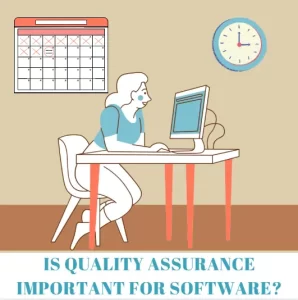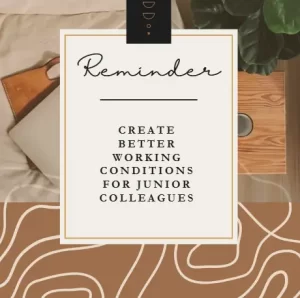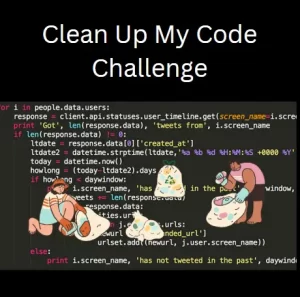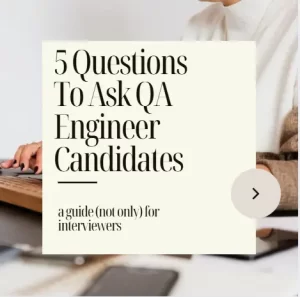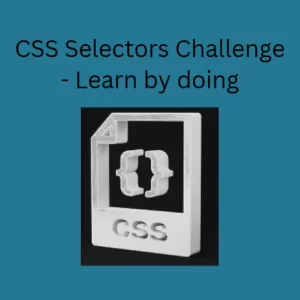Top 5 Interview Questions For QA Engineers
Every single day I see at least one article on the Internet about interview questions and how to answer them if you are a job candidate. However, no one is giving any advice to the interviewers what to ask and what to expect as an answer. David Ingraham wrote one of really good articles on how to conduct a coding interview for QA engineers. As a supplement to that article and David’s view of coding assignments I am creating this article with my list of interview questions for QA engineers.
1. Dealing with missing documentation
This is one of those situations which are not that uncommon especially for startup companies. Quite often they try to save some time by not documenting things they do. This is a common mistake which haunts the company in more mature phases of company growth. No requirements, specifications or user guides which could help you with getting to know the business logic of the system under test.
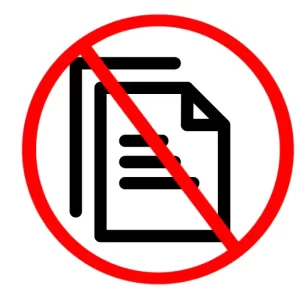
The Question: “You find yourself in a new company as a QA engineer and you should do a regression testing of a part of the application, but you don’t know how it works. How would you approach such task?”
The Expectations: With this question I’m trying to find out how resourceful is the candidate? What is his train of thoughts? Would he try to figure out the system under test on his own or he would ask for help? Does he have a problem with asking for help?
The Answer: On a junior level I would expect to hear about exploratory testing and asking senior colleagues for help. Typically, I would love to hear a well organized thoughts. Questions from candidate about other tools the company uses are a plus. I consider that an attempt to figure out what else could be helpful as a source of information On a more senior level I would love to hear how the candidate would use bug tracking tool to dig up old bugs related to that part of the application as a learning resource. It would be impressive if the candidate would mention going through the test suite to find out how something should work. A more elaborate answer to this question is in this article.
2. Improving testing process
Bugs in production are something we all try to prevent. Knowing that there is no perfect testing process as there is no software without bugs, QA engineers always strive to improve the process. This process change should result in less bugs in production.
The Question: “Your team has been experiencing a high rate of escaped defects. What steps would you take to analyze and improve the testing process?”
The Expectations: This question help me understand if the candidate participated in analysis of testing processes. It also gives a full liberty to the candidate to explain a perfect testing process from his perspective.
The Answer: There are no limits in this question. I expect to hear about various process updates like Shift left, Shift right, post-mortem analysis, additional resources hired for QA team, etc. There are no wrong answers in this question and higher score goes to the candidates who have the best approach.
3. Tight deadline problem
A conflict between management requirements to deliver software and quality is also not an uncommon thing. This is exactly why this appears often among interview questions for QA engineers. Pushing changes to production without proper testing is never a good idea. That doesn’t mean it never happens. The truth is, sometimes QA engineers are left with very little time to complete their work. This can be not only challenging but also very stressful.
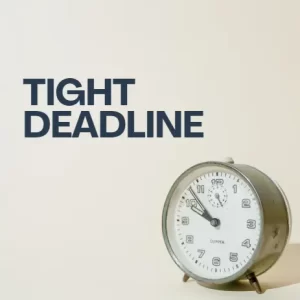
The Question: “Imagine you are assigned to test a critical feature, but the development team delivers it later than expected, leaving you with only two days to complete testing. How would you approach this situation to ensure the quality of the product is not compromised?”
The Expectations: This question is quite multilayered. The answer could show me what is the focus of the candidate. Is he focusing on the task that should be completed or on a faulty process that left him without any meaningful time to complete his work? It is a good test of someone’s time management skills, resourcefulness, analytics and creativity.
The Answer: I would expect to hear at least about doing risk analysis of the feature in question. Creating tests surrounding the most critical parts where we noticed the most defects. Checking the complexity of the software and performing prioritization based on that. Advanced answer would go into improving the testing process by incorporating Shift left approach to ensure higher quality at earlier stages of development. I would also love to hear more about changing the process of development in favor of Test Driven Development. TDD in this case as a technique for development of high quality features.
4. Flaky test strategy
We’ve all faced flaky tests in our test suites. This is nothing uncommon with large suites and ever changing applications. The real question is how to fix them and increase the reliability of our tests. I believe this question can be heard often among interview questions for QA engineers.
The Question: “Every time I run the tests a different set of tests fail. I re-run them and the failed tests will pass, but some others may fail. What could be the causes of such behavior?”
The Expectations: For this question my expectation would be to hear what are some of the common causes of flaky tests the candidate faced in his professional life. I would also love to hear about possible strategies for resolving such issues. It shows that candidate has worked with some of the real problems QA engineers face everyday.
The Answer: There are a number of reasons why some of the tests might fail. I would expect an answer that covers concurrency issues, test dependency, infrastructure issues, non-deterministic or repeating test data.
5. What is quality?
We are quality engineers, but it is quite surprising that in a large number of cases we don’t think about the definition of quality. Well, not the actual definition but what it means to us. American Society for Quality has a definition of quality:
A subjective term for which each person or sector has its own definition. In technical usage, quality can have two meanings: 1) the characteristics of a product or service that bear on its ability to satisfy stated or implied needs; 2) a product or service free of deficiencies. According to Joseph Juran, quality means “fitness for use”; according to Philip Crosby, it means “conformance to requirements.”
The Question: “How would you define quality?”
The Expectations: Obviously this is an open question with a lot of possibilities to expand the discussion. There is no right or wrong answer here. I would prefer clear thoughts on defining a quality standard in candidate’s own words over some definition.
The Answer: The main expectation would be for candidate to acknowledge the client’s perspective on quality. There could be a misalignment between the development team and the client on quality, yet the end user of the software might have a third expectation. The discussion can go in various directions like managing expectations, understanding the needs of the client, managing own bias, effective communication, etc. This shows that the candidate understands the need for constant communication with the client and refinement of requirements.
Conclusion
Remember that each of the possible answers given by the candidate open a new subject for conversation. Additional questions are welcome just to dive deeper in the candidates process of thinking. If you are a candidate you have to prepare for additional questions and explanations of every strategy you offer. It would be useful to answer the questions using STAR method which would help the interviewer better assess your skills, communication and knowledge. What are your favorite interview questions for QA engineers?
